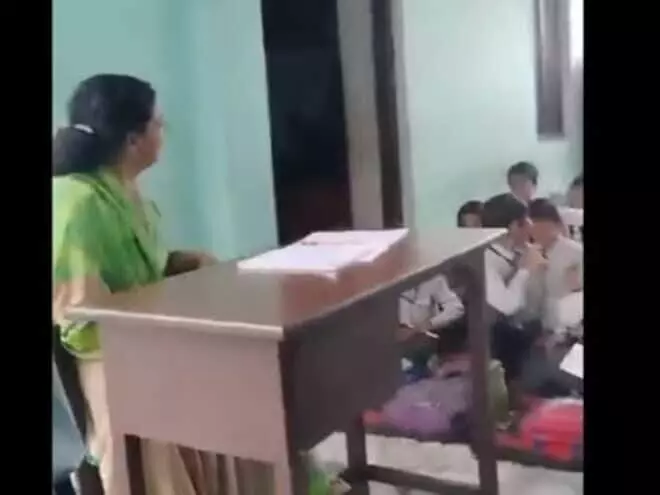
In the supermarket of hate
text_fieldsUP school teacher asks students to strike classmate
That video scene from UP's Muzaffarnagar school is perhaps a perfect metaphor for the state of the country today. The teacher who got the seven-year-old student slapped in the face and back by other students says that it is because he did not learn multiplication properly. Calling the boy a 'Mohammedan', she forces the boy's classmates to slap him harder. This is how Tripta Tyagi of the Qubbapur Neha Public School 'teaches' the children. At first, the police did not act on the grounds that none of the parents had complained, even though the police should file a case on their own initiative. The parents, on the other hand, decided to transfer the child to another school when the school authorities refunded the fees paid. The father explained that he did not complain because he knew that even if he complained to the police it would be bring no action. When the video went viral and there was a clamor for action against the teacher, the police came out to file an FIR that too on a minor charge. The teacher apologized but later clarified that she did not regret the incident. Hatred, racism, abuse of power, inaction of the authorities, willingness to justify any misdeed – all these combined to become the incident of teaching how to beat, and sadly enough coinciding with India's signal feat of touching the moon.
This is yet another example of how deeply hatred and communalism have got into the nerves of the nation. Last month, a member of the security force, who was supposed to ensure security in the train, searched for and shot people of a particular community among the passengers. Racism continues to be institutionalized. Criminals are celebrated. Reports of state-sponsored and instigated hate crimes abound. Even the education sector is polluted to the extent that poison is injected even into the minds of children. A few months ago, a student had to respond to labelling as a 'terrorist' in a college in Karnataka. The problem is not only that the ideology of division is transmitted to the younger generation, but even the teachers, who are expected to inculcate human values, become agents of hate politics. It doesn't stop there: even among those who we consider to be educated, discrimination and prejudice are gaining respect and acceptance. The role of Hindutva politics in making the country gripped by the ideology of violence in such range and depth is undeniably evident.
There are those who rejoice when evil and violence run amok; there are people who work overtime to spread wider the poison capable of destroying the country. The onus is not on the victims to mount a proper defence against it. Both the administration and the judiciary are responsible for this. They often fail the citizenry in this role. Democratic and legal solutions must be taken seriously by the real popular forces. When voices of divisiveness cause even children to slap each other, it is not anyone else who needs to recognize the danger and stop it, it is everyone of us. It was a strong message that the farmer leader Naresh Tikayat conveyed when he made the slapper and the slapped in the school incident embrace each other. At the same time, the attempt to avoid legal action against the offending teacher only helps the institutionalization of such hate crimes. Equally worrisome is the silence in many quarters who can try to prevent evil. Religious leaders and spiritual teachers should not imitate the silence of the administrative leadership that does not utter a word even when a state is burning or when minds are polluted in schools. Today, when the forces of Hindutva politics are inciting hatred in the name of Hinduism, it is the religious leaders and organizations who should come out asserting that this is not Hinduism. People are like children in that school. The supermarket of hatred will corrupt; the shop of love will unite. Let religion prove to be love.

























